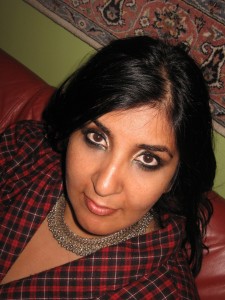Pot Roast and Imperial Justifications
By Amal Rana
“how come you don’t cover your hair?”
my breath punches out of me in one big gasp
as I pretend not to hear her
“so how come you don’t cover your hair like all the women in your country?”
she asks me again
persistent, insistent, she is unaware that there is any problem with her question
I am slow to answer
trying to sort out what just happened
30 seconds ago
we were talking about our lives as immigrant women
as two South Asian women
she Indian
I Pakistani
we shared the same story of discovering the real underbelly of the Great Canadian Dream
the search for the better life that somehow deflated into disillusionment
she, was an art history professor back in India
my father, a mechanical engineer in Pakistan
she works for a janitorial company cleaning offices
my father could not even get a job in a gas station
too brown
too old
Mohammed was too Muslim sounding a name in a country
where everyone suddenly morphs into Moe to make it easier on those
white canadians who can’t be bothered with the correct pronunciations of our difficult foreign sounding names
30 seconds ago
we were connecting across our commonalties
our similarities
and now i am left shocked
to hear that oh-so-common ignorant question from such an unexpected source
from a woman who looks like she could be my sister
we are technically from different countries
but we are both Punjabi
we speak the same tongue
eat the same food
but there is suddenly a fence of barbed wire and stereotypes between us
there is so much I want to explain to her in response to her question
I want to tell her that not all Pakistani or Muslim women cover their hair
some do and some don’t
I want to tell her that in Pakistan, women have always been on the frontlines of the struggle
standing down guns, tanks and the ever increasing and terrifying presence of
american drones
our heads may be covered or uncovered, but we have always held them high
I want to tell her that our identities are fluid and diverse
and cannot be defined by Islamophobic headlines that reduce us to sound bytes about gun toting mullahs, home grown terrorists and corrupt politicians
we are a country where lawyers, particularly women, were willing to lead a revolution against tyranny that electrified the world
I want to tell her that in Swat
yes in Swat, that supposed hot bed of terrorism and “uncivilized” chaos
people are still risking their lives to keep schools for girls open
I want to tell her that on any given day
someone’s brother, someone’s sister, someone’s son, daughter, mother, father
is disappeared in the name of the so called war on terror
which for us has become the war of terror,
a war now rebranded with a new name – “AF-PAK”
by a new imperial emperor who may have a Muslim middle name
but who wears on his head the already tarnishing laurels of a Nobel Peace Prize earned by bombing innocent children
on any given day, entire villages are blown up by remote controlled drone aircraft
driven by some soccer dad in a military compound in las vegas
who then goes home to his wife and kids
and a fine american meal of pot roast and justifications in the name of freedom
I want to tell her that those Pakistani women that she imagines as one faceless, nameless unknown entity with covered hair and silent voices
look just like her from the cockpit of a U.S. helicopter gunship
__________________________________
 Author Bio: Amal Rana is a Jeddah born, Pakistani Muslim activist and poet who draws inspiration from the works of warrior poets such as Faiz Ahmed Faiz, Pat Parker, Jewelle Gomez and many others who may not yet be widely recognized but whose words are no less powerful. In a time when even exhaling while being Muslim seems to have become a crime, she sees poetry as an act of sedition and collective resistance. Her work has been published in various places but fits best in grassroots zines and on the streets. Amongst other things, she spends her time helping make puppets and street art that reflect the true nature of dictators and other evil doers while working with other Pakistanis to seek real “hope” and “change” in Pakistan instead of democracy “Amreekan” style. She believes humour and love are an essential part of any revolution and that simply by existing and speaking to our own realities as Muslim women, we are being radical.
Author Bio: Amal Rana is a Jeddah born, Pakistani Muslim activist and poet who draws inspiration from the works of warrior poets such as Faiz Ahmed Faiz, Pat Parker, Jewelle Gomez and many others who may not yet be widely recognized but whose words are no less powerful. In a time when even exhaling while being Muslim seems to have become a crime, she sees poetry as an act of sedition and collective resistance. Her work has been published in various places but fits best in grassroots zines and on the streets. Amongst other things, she spends her time helping make puppets and street art that reflect the true nature of dictators and other evil doers while working with other Pakistanis to seek real “hope” and “change” in Pakistan instead of democracy “Amreekan” style. She believes humour and love are an essential part of any revolution and that simply by existing and speaking to our own realities as Muslim women, we are being radical.



36 Comments